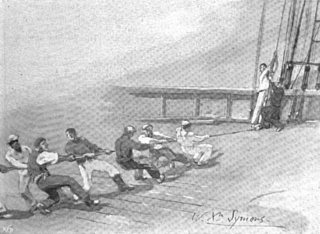Related Research Articles

A sea shanty, chantey, or chanty is a genre of traditional folk song that was once commonly sung as a work song to accompany rhythmical labor aboard large merchant sailing vessels. The term shanty most accurately refers to a specific style of work song belonging to this historical repertoire. However, in recent, popular usage, the scope of its definition is sometimes expanded to admit a wider range of repertoire and characteristics, or to refer to a "maritime work song" in general.

Albert Lancaster Lloyd, usually known as A. L. Lloyd or Bert Lloyd, was an English folk singer and collector of folk songs, and as such was a key figure in the British folk revival of the 1950s and 1960s. While Lloyd is most widely known for his work with British folk music, he had a keen interest in the music of Spain, Latin America, Southeastern Europe and Australia. He recorded at least six discs of Australian Bush ballads and folk music.
Cyril Tawney was an English singer-songwriter and a proponent of the traditional songs of the West of England, as well as traditional and modern maritime songs.
"Drunken Sailor", also known as "What Shall We Do with a/the Drunken Sailor?" or "Up She Rises", is a traditional English sea shanty, listed as No. 322 in the Roud Folk Song Index. It was sung aboard English sailing ships at least as early as the 1830s.

William Pint and Felicia Dale are folk musicians based in Seattle. Known primarily for nautical music and sea chanties, they are among the best-known performers in that genre in the United States. Their albums have been favorably reviewed in Dirty Linen magazine, Sing Out! magazine, and Folk Roots magazine. They tour regularly in the UK as well as the United States and have also performed in The Netherlands, Germany, Poland and Estonia. Between 1988 and 1991 they performed with Canadian performer Tom Lewis.

Stanley James Hugill was a British folk music performer, artist and sea music historian, known as the "Last Working Shantyman" and described as the "20th century guardian of the tradition".
"Oh Shenandoah" is a traditional folk song, sung in the Americas, of uncertain origin, dating to the early 19th century.
"South Australia" is a sea shanty, also known under such titles as "Rolling King" and "Bound for South Australia". As an original worksong it was sung in a variety of trades, including being used by the wool and later the wheat traders who worked the clipper ships between Australian ports and London. In adapted form, it is now a very popular song among folk music performers that is recorded by many artists and is present in many of today's song books.

The Fisherman's Friends are a folk music group from Port Isaac, Cornwall, who sing sea shanties. They have been performing locally since 1995, and signed a record deal with Universal Music in March 2010. Whilst essentially an a cappella group, their studio recordings and live performances now often include traditional simple instrumentation.

Bounding Main is an American a cappella quintet focusing on traditional sea shanties and maritime music.
Frank Noah Proffitt was an Appalachian old time banjoist who preserved the song "Tom Dooley" in the form we know it today and was a key figure in inspiring musicians of the 1960s and 1970s to play the traditional five-string banjo.

Jerry Bryant is an American folksinger specializing in maritime music. In addition to performing traditional songs, he also has written songs in a traditional style. Of his original songs, The Ballad of Harbo and Samuelsen is among his best known and has been recorded by several other performers including William Pint and Felicia Dale, Forebitter, and Rick Lee.
Tom and Chris Kastle are a maritime music performing duo based in Chicago. They first began performing maritime music in approximately 1977. In the mid-1980s they were known for running "whale watching" concert cruises on Lake Michigan on the sailing schooner Charlotte Ann.
Danny Spooner was an Australian traditional folk singer and social historian. Born in England, he left school at the age of 13 and worked as a salvage tug and trawler skipper before moving to Australia in 1962. He rapidly became involved in the Melbourne folk revival centred on Frank Traynor's folk club, and was a major figure in the Australian folk scene thereafter.
Oscar Brand was a Canadian-born American folk singer-songwriter, radio host, and author. He released nearly 100 albums and composed hundreds of songs, among them Canadian patriotic songs, songs of the U.S. Armed Forces, sea shanties, presidential campaign songs over the years, and songs of protest. His discography is extensive.

The Chicago Maritime Festival is a maritime music and culture festival held in Chicago, Illinois, every winter, usually the last weekend in February, usually at the Chicago History Museum. It is not uncommon for over 500 people to participate. It has existed in its present incarnation since 2003 and is the only wintertime festival featuring maritime music in the United States. The main organizers are performers Tom & Chris Kastle.

Jim Mageean is an English folk singer based in Cullercoats, Tyne and Wear, England, specialising in Sea Shanties, traditional maritime music and "Geordie" songs from his native North East of England.
William Boultbee Whall was a master mariner, who compiled one of the first collections of English sea songs and shanties in 1910. He joined the Merchant Navy as a boy of 14 and learned the songs during 11 years aboard East Indiamen. In the foreword to his book he wrote that he thought the songs "worthy of preservation". In addition, Whall wrote a number of books about navigation and practical seamanship.
References
- 1 2 3 4 "The Gravedigger's Daughter" by Heidi Chan, Canadian Folk Music Fall 2013, volume 47, issue 3, page 28.
- 1 2 3 "Tom Lewis," All Music Guide. The Best CDs, Albums & Tapes by Michael Erlewine, Chris Woodstra, and Vladimir Bogdanov, Miller Freeman, 1994, page 508.
- 1 2 "Songs and Lore of The Sea with Tom Lewis," The Journal of Music , 22 July 2022.
- 1 2 3 4 5 6 7 8 9 "Tom Lewis," MusicHound Folk: The Essential Album Guide edited by Neal Walters and Brian Mansfield, Visible Ink, 1998, page 473.
- ↑ "Mystic Seaport Sea Music Festival," Maritime Music Directory International, accessed 28 August 2023.
- ↑ Three Days in August: Summerfolk, The First Twenty Years by Kate Walsh, Georgian Bay Folk Society, page 65.
- 1 2 3 "Tom Lewis," Northern Journey 2: A Guide to Canadian Folk Music on CD by Gene Wilburn, Reference Press, Ontario, 1998, page 167.
- ↑ "Sea Shanties and sea tales by Tom Lewis at The Dock," Leitrim Observer 17 July 2022.
- ↑ "Take a voyage on the high seas through the songs of Tom Lewis," Campbell River Mirror , 19 May 2016.
- ↑ "Surfacing" by Geoff Butler, Canadian Folk Music, March 1989, volume 23, issue 1, page 20.
- ↑ "QFTRY & TOM LEWIS, Po!es Apart Too: The Song Goes On" by M.R., Sing Out! . Winter 2013, volume 55, issue 2, page 46.
- ↑ Moeller, Matthew (May 2008). "Worth the singin'" (PDF). Victory Review. 33 (5): 18. Archived from the original (PDF) on 5 September 2008.
- ↑ "Archived Copy of Gloucester Shanty Festival website". Archived from the original on 14 September 2017. Retrieved 7 February 2016.
- ↑ "Johnny's Gig Guide: Charity concert as part of Gloucester Shanty Festival" by Johnny Coppin, BBC, 26 March 2016.
- ↑ "Tom Lewis" by Barry Hammond, Penguin Eggs, summer 2004, number 22, page 59.
- ↑ "Songs of the Sea" by Mike Ballantyne, Canadian Folk Music, June 1997, volume 31, issue 2, page 36.
- ↑ "Tinker, Tailor, Soldier, Singer!" by Mike Ballantyne, Canadian Folk Music, June 1996, volume 30, issue 2, pages 41-42.